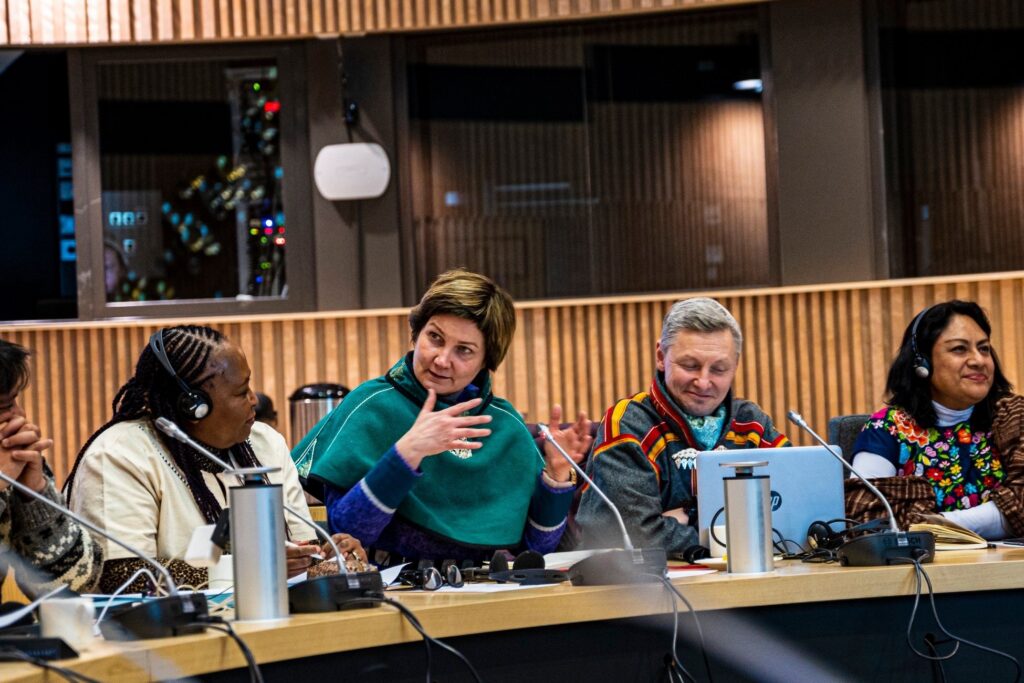
On Saturday, February 15, prominent indigenous representatives, rights activists and other actors from all continents gathered in Inari, Finland, to attend a peer-training workshop on Indigenous truth and reconciliation practices. The workshop was initiated as part of the partnership between the Mary Hoch Center for Reconciliation (MHCR) and the United Nations Permanent Forum on Indigenous Issues (UNPFII) to support indigenous Truth and Reconciliation Processes worldwide.
Antti Pentikäinen, director of MHCR and research professor at the School for Conflict Analysis and Resolution, soon to be the Carter School for Peace and Conflict Resolution, at George Mason University, was invited to co-facilitate the workshop alongside independent expert on indigenous truth and reconciliation processes and recent MHCR affiliate, Eduardo Gonzalez. The workshop served as a peer training in truth and reconciliation processes for mainly Nordic Sámi participants, including representatives of the Nordic Sámi Parliaments and prominent Sami rights activists. The 25 participants included 14 UNPFII board members as well as a number of people directly involved in Sámi issues.
Pentikäinen had previously taught a pilot course on Indigenous Reconciliation to Sámi communities and others involved in issues related to Sámi rights and livelihoods, including other inhabitants of Lapland. As an outcome of the joint deliberations from the pilot course, Pentikäinen presented a three-track approach to reconciliation and proposed the complementary role of Insider Reconcilers to Truth and Reconciliation Commissions. A group of participants from the pilot course were present at the workshop in February and shared their experiences.
One of these participants, Kii Korhonen, serves as the Director of Forestry in Lapland (Metsähallitus), which is a state enterprise managing state-owned lands and waters. Korhonen shared that the pilot course had changed the whole Forestry Board’s approach to resolving environmental and livelihood disputes. The Forestry Board is now training its staff and testing the models elsewhere. They will begin to apply the new findings in Sámi Land in near future. This illustrates how reconciliation training can be used in the governance of natural resources and environmental dispute resolution.
“It was important for the UNPFII to hear how reconciliation does not mean you give up your rights but how Governments can come to realize how to consult and resolve issues with indigenous peoples,” said Pentikäinen.
The workshop in February was designed to be an opportunity for peer-training, where participants were invited to exchange ideas and experiences and reflect on their own indigenous healing practices and experiences on the connection of indigenous rights and reconciliation. Over the course of the weekend, participants heard three Nordic Sámi Presidents speak about their practices, discuss the successes and challenges of their national Truth and Reconciliation processes, and reflect on their own leadership styles and how they impacted these processes.
“Everyone owns their own conflict, and they eventually know how best to solve it, so the intention of a peer training is to provide different angles to enrich what can be possible and how to continue to explore options and resolutions. These cannot come from outside,” said Pentikäinen.
An especially valuable component of the workshop was the inclusion of the UNPFII board members and the international perspectives they brought to the conversations. Indigenous communities around the world face similar struggles for their rights to governance, resources, identity, and culture. The fourteen board members present represented Burundi, Nepal, Bolivia, Russia, Australia, Colombia, Namibia, Chad, Mexico, USA, Estonia, Ecuador, China, and the indigenous communities in those regions. Each was able to share and reflect on their own challenges and explore solutions, which enabled a rich exchange of experience and reflection.
When asked about the global representation at the workshop, Pentikäinen’s response was honest. While representation at such a level is incredible, no doubt, there remains a sense of heaviness and urgency to these gatherings that cannot be ignored.
“Unfortunately, it’s built around the pain. There are a lot of different genocides that have happened, and these realities continue to affect indigenous people. Basically, the harm is ongoing, and the fight for survival is very real.”
According to Pentikäinen, indigenous communities often struggle trusting outside researchers, and the science community has made many mistakes in the past. As a result, when involved with indigenous communities, it is important to act at their invitation and ensure that the benefits of the research and participation of indigenous researchers are openly discussed and explored.
Eduardo Gonzalez, a Peruvian expert, presented the experiences of truth and reconciliation commissions around the world that have conducted inquiries on the violation of indigenous rights in the context of armed conflict, authoritarianism, and colonialism. He explained that indigenous peoples may not feel represented in notions of “national reconciliation” if these concepts do not recognize their unique identity, and that they may feel more recognized in a model of “nation to nation” reconciliation. Also, he emphasized that any truth and reconciliation process initiated by a government must respect the right of indigenous peoples to consultation, based in the principle of free, prior and informed consent.
At the end of the weekend, The UNPFII board concluded that there is a greater need for peer-exchanges and planned to establish a working group to facilitate the continuation of such exchanges on truth and reconciliation processes and practices. Gonzalez and Pentikainen were invited to assist the process.
Pentikäinen said that the Mary Hoch Center for Reconciliation is honored to assist in such process and has invited Eduardo Gonzalez to become affiliate with MHCR and the Carter School to lead these efforts.The workshop in Inari was hosted by the Deaconess Institute. Mary Hoch Center for Reconciliation is a partner of #reconciliation.